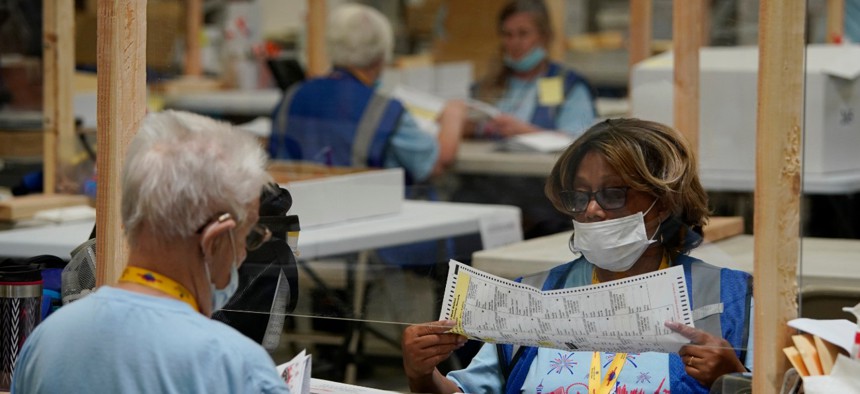
Election workers process mail-in ballots during a nearly all-mail primary election on Tuesday, June 9, 2020, in Las Vegas. John Locher
Election Assistance Commission Regains Permanent Leaders In Top Positions
After nearly eight months, the agency now has a permanent executive director and general counsel.
With election season well underway, the federal agency responsible for election administration finally has filled its two most senior positions.
The Election Assistance Commission announced on Wednesday that the commissioners approved by unanimous consent Mona Harrington as executive director (who was previously serving in an acting capacity) and Kevin Rayburn as general counsel (formerly a top election official in Georgia). The posts had been without permanent leadership since early September, when the commissioners voted not to reappoint then Executive Director Brian Newby and General Counsel Cliff Tatum.
“This unanimous vote of the commission shows the confidence we have in these great candidates to lead the EAC into its next chapter,” said Chairman Ben Hovland. “Ensuring elections are secure, accessible, accurate and safe is critical for every election, and 2020 has presented unique challenges. With Ms. Harrington and Mr. Rayburn leading our staff, the EAC is better positioned to add value to the elections community and help election officials in the lead up to November and for years to come.”
Harrington has 18 years of experience in federal executive roles and was named acting executive director of the EAC in October 2019. Since then she led a reorganization effort, boosted hiring, created a new cybersecurity team, led the distribution of $425 million in election security grants and $400 million in CARES Act funds to the states, and spearheaded resources for states conducting primaries and caucuses during the pandemic.
“I often say the EAC is small but mighty, and I'm proud to lead our staff as we continue to grow," said Harrington. The EAC was established by the 2002 Help America Vote Act but for years has been hampered by staffing and funding cuts as well as Republicans’ threats to disband it.
Rayburn, a lawyer with both public and private experience, was until recently the deputy elections director and deputy general counsel for the Georgia Office of the Secretary of State. Georgia was one of three states listed in a July 2018 indictment by then-Special Counsel Robert Mueller charging 12 Russians with interfering in the 2016 elections. A report by the Senate Intelligence Committee later confirmed Russia targeted all 50 states. Georgia also has been embroiled in lawsuits over the reliability of its voting machines and charges of voter suppression. Most recently, during the state’s 2020 primary on Tuesday there were hours-long lines to vote, which officials attributed to issues with the state’s new voting machines.
Nonetheless, EAC Vice Chair Donald Palmer said, “Mr. Rayburn’s background in elections at the state level and his extensive legal expertise will be a huge asset for the EAC. We are confident that Mr. Rayburn will be a great addition to the team and have an immediate impact.”
As the only federal agency dedicated solely to election administration, the EAC faces a steep challenge this election year, which already has been seriously disrupted by the pandemic. “Election officials all over the country are having to make difficult decisions on how to best serve their voters,” EAC officials told Government Executive in March. “The EAC is doing all it can to provide information to assist the states in making informed decisions. We will continue to work with federal, state, and local partners on this evolving situation.”
Among the resources the EAC puts out are: guidelines on how to properly sanitize voting machines by vendor type, best hygiene practices for poll workers, CDC’s guidance for voting locations, and the Cybersecurity and Infrastructure Security Agency’s recommendations to mitigate cyber risks.
The agency is also in the process of updating its voluntary voting guidelines to reflect technology and security developments since 2015, when it was last modified.







